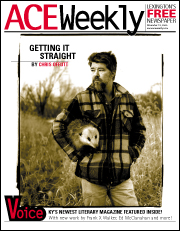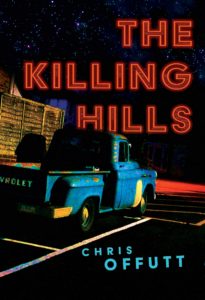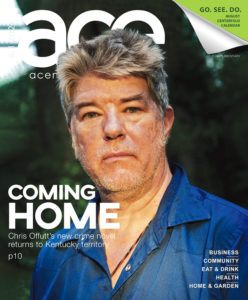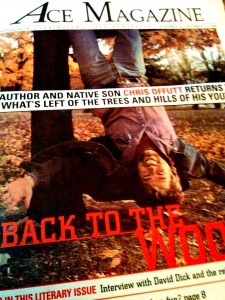Home Coming
Chris Offutt’s new novel is thinking about it
By KEVIN NANCE
After Chris Offutt burst onto the scene in the 1990s with the short story collection Kentucky Straight, the memoir The Same River Twice and the novel The Good Brother, he built a reputation as a distinctly literary writer. His sentences gleamed. His characters were etched with economy and precision. His insights penetrated and resonated. Best of all, he swathed his stories in a glimmering robe of rich detail about the landscape and culture of Eastern Kentucky, drawn from his life growing up in the small coal-mining community of Haldeman in Rowan County.

It may come as a surprise to his most loyal readers, then, that his new book, The Killing Hills, is a crime novel. Set like most of Offutt’s work in Eastern Kentucky, this lean page-turner races along in brief chapters punctuated by spasms of violence, along the way observing all the major conventions of the genre. They include the discovery of a murder victim in the opening scene (here a middle-aged local woman with no known enemies, her body dumped “like trash” in the woods) followed by an investigation by a tough, smart sleuth, in this case Mick Hardin, a native of the area currently on leave from his job as a U.S. Army detective. (He takes the assignment as a favor to his sister, the local sheriff, and ends up so engrossed in it — and so ticked off by its mounting obstacles, including the corrupt local powers-that-be — that he risks going AWOL to finish the job.)
The universe of The Killing Hills is a fictionalized version of “the four square miles where I grew up” in Haldeman, as Offutt puts it. “I just change the names and play fast and loose with the geography.”
The book has made something of a stir, including a New York Times review by novelist Joyce Carol Oates, who noted its “deftly plotted short chapters, fast-moving story line, minimal characterizations and strong regional atmosphere.” It has also generated a certain amount of buzz about the possibility of being adapted into a movie or, as Oates put it, “a high-quality crime series set in rural America” such as HBO’s Mare of Easttown or True Detective.

The buzz is not entirely wishful thinking, Offutt tells us in a recent from his home near Oxford where he teaches screenwriting at the University of Mississippi, drawing on lessons learned writing episodes of Weeds, True Blood, Treme and other shows during a stint in Hollywood a few years back.
“Let’s say there has been serious interest,” says the author, now 62. “I have an agent who’s handling that, and I think it would be great. I would love it. On the other hand, I know better than to pin any hopes on Hollywood. I learned that lesson that the hard way.” (Offutt wrote several much-praised pilots for new series during his years in Los Angeles, all of them ultimately unproduced. “Each one I wrote, I thought it would be on the air,” he says, “but none of it happened.”)
In the meantime, Offutt is having what he describes as the most productive and enjoyable time of his writing life with the Mick Hardin books. Yes, books: The Killing Hills, originally planned as a one-off, has spawned a series of novels, all set in Eastern Kentucky and centering on Hardin. Shifty’s Boy, the sequel — in which Mitch returns to his hometown of Rocksalt to recover from war wounds, only to get caught up in another harrowing investigation — is complete and set for publication by Grove next June. A third, as-yet-untitled Hardin novel is well under way (“I’m on page 233,” Offutt says) and will see print in 2023.
“I never enjoyed writing anything as much as The Killing Hills,” he says. “I wanted to show the world where I grew up, how the people are there, and I thought Mick was the ideal candidate for a protagonist because he was from there but had left and come back. He benefits both from having grown up there, which gives him all this knowledge of the place and the culture, and from having gone away, which gives him more objectivity.”

With all due respect to Mick, it’s fair to say that the main character of these novels is Eastern Kentucky itself, specifically a thinly veiled fictional version of “the four square miles where I grew up” in Haldeman, as Offutt puts it. “I just change the names and play fast and loose with the geography.”
And for all the tautness and high velocity of The Killing Hills, the author manages to lay on ribbons of his trademark local color and texture, particularly in his descriptions of the landscape, which thrum with a spartan poetry reminiscent of James Dickey and Cormac McCarthy. “The old man walked the hill with a long stick, pushing aside mayapple and horseweed, seeking ginseng,” goes the novel’s opening sentence. Later, “Mick left the blacktop for a single-lane dirt road that rose and dipped with the land. Glade fern swayed near mudholes in the low parts while the higher sections held chickweed and groundcherry.”

“Every Kentuckian is going home or thinking about it, and that’s part of why I love writing the Hardin books. It puts me right back in the woods in my mind, feeling safe and comfortable. It allows me to go home.”
—Chris Offutt, paraphrasing Happy Chandler
“Early in his career, it was important for Chris to establish a literary reputation,” says his wife, the poet and novelist Melissa Ginsburg. “But he’s always loved reading crime novels, so I was glad to see him embracing something he’s loved. And as it turns out, the voice in this new novel is his actual voice, more than anything else he’s written.”
Offutt agrees, paraphrasing the late Gov. Albert “Happy” Chandler: “Every Kentuckian is going home or thinking about it, and that’s part of why I love writing the Hardin books. It puts me right back in the woods in my mind, feeling safe and comfortable. It allows me to go home.”
___
This also appears on page 10 & 11 of the August 2021 print edition of ace magazine.
Subscribe to the Ace e-dition for Lexington news, arts, culture, food, and entertainment news delivered to your inbox.
Call today to advertise in Ace, 859.225.4889








